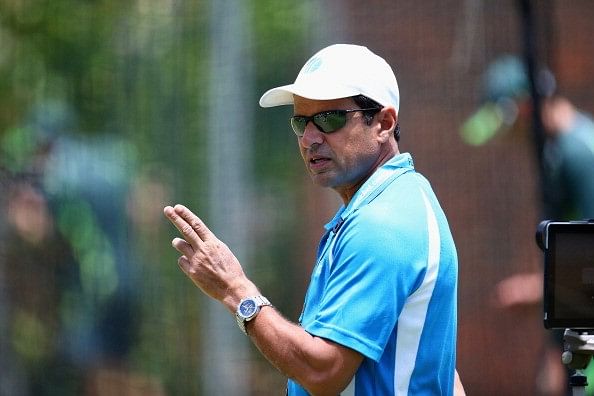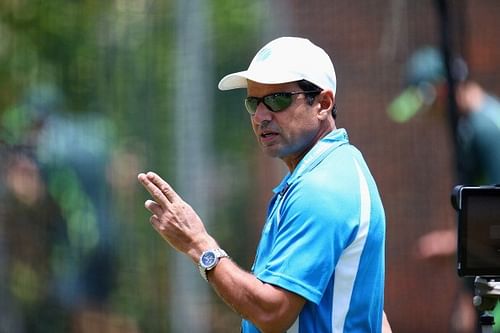
What have the umpires and commentators got to do with the politics?
India and Pakistan were scheduled to hold talks keeping in mind the bilateral series which as per the Future Tours Programme should be hosted by the latter in December 2015.
On Monday, PCB chief Shaharyar Khan arrived in Mumbai to speak with his Indian counterpart, Shashank Manohar, on the issue but the meeting couldn't happen. Why? Because a few Shiv Sena activists barged into the BCCI premises, holding placards, asking for Mr Khan to return back to his homeland, which eventually led to the meeting being shifted to Delhi, the following day.
While politics may have won the bigger battle, the events that transpired in the evening left some of us even more thinking about where we are actually heading with the India-Pakistan issue.
Why bring the umpires in?
As I switched on my television at around 7 PM last evening, I was shocked to see one of the TV channels report about the ICC withdrawing Aleem Dar from the remaining 2 One-Day Internationals between India and South Africa in Chennai and Mumbai respectively.
My first reaction, and I am assuming the reaction of a few others, on reading that was: How does that even matter? For the longest time, we have vouched that umpires are totally neutral participants in a cricket match. They don't have favourites. Thay don't interfere in the calls made by the captain. Then why should it matter if they are from a particular country and hence because of that, should be withdrawn from officiating in a match of cricket at specific venues?
Aleem Dar has stood in 175 ODIs and has won the ICC Umpire of the Year on three consecutive occasions. Purely from a cricketing perspective, the presence of a good umpire is even more vital, considering the quality of officiating we have observed in the series thus far.
Consider this situation: What if in a World T20 game at the Wankhede Stadium Mr Dar is the third umpire. Will the activists then barge into the box and break glasses? Will they disrupt the game, even if he isn't actually on the field?
To me, this decision of removing him from the final two matches makes absolutely no sense for the simple reason that he has no effect on the game, with regards to the on-field action. He is there to do his job, which is to give decisions in a fair manner and by taking him away, you are letting him not perform his job, which he has been doing for a while.
Commentators get involved as well
So as this news began to digest, another one cropped up. Wasim Akram and Shoaib Akhtar, both of whom, are part of the commentary team for the ongoing series, will not air their views in the final ODI at Mumbai.
Again, why? Here are two guys who are loved in India, who come to the country regularly to cover cricket and express their views. How are they going to have any direct impact on the match?
During the 2015 World Cup, Mohammad Shami had this to say:
“The recent change in run-up has surely increased my pace. So I am continuing with it and hoping that it pays rich dividends. I did have a chat with Shoaib (Akhtar) bhai and he suggested that I should reduce my big strides. So shortened my stride and it has worked. It (the new run-up) is smooth and comfortable and it has also increased my pace,”
The changes proved to be beneficial as Shami turned out to be India’s second highest wicket taker in the event. If Akhtar has been working more on an experts role, Akram has been working hands-on with the Indian Premier League franchise Kolkata Knight Riders and one man, who had benefited from his experience has been Umesh Yadav who has this to say about the great man:
“I have learnt a lot from him. I enjoy working with him. He talks about swing and controlling the ball. The more you are able to control the ball the better you will be able to control the swing. So he tells me how to control the ball. For example, the wrist position - it should lock, the two main fingers should be behind the seam, and so on."
Sanjay Manjrekar had tweeted this during one of the games last year:
Why then are we barring them from expressing their views? Aren't they entitled to do so? For the time that they have been commentating, I can't recollect any instance when they have spoken ill of India or praised Pakistan uncharacteristically.
For the longest time, we have spoken about how sports and politics shouldn't be brought into the same space and that the former should never have a bearing on what happens in the latter but clearly, that opinion of ours seems to have had no effect.
When we are living in times where the thinking of the common man is evolving, these decisions come as a huge blow and hopefully, in the future, better sense prevails and the sport, indeed, is cut off from all the politics.
